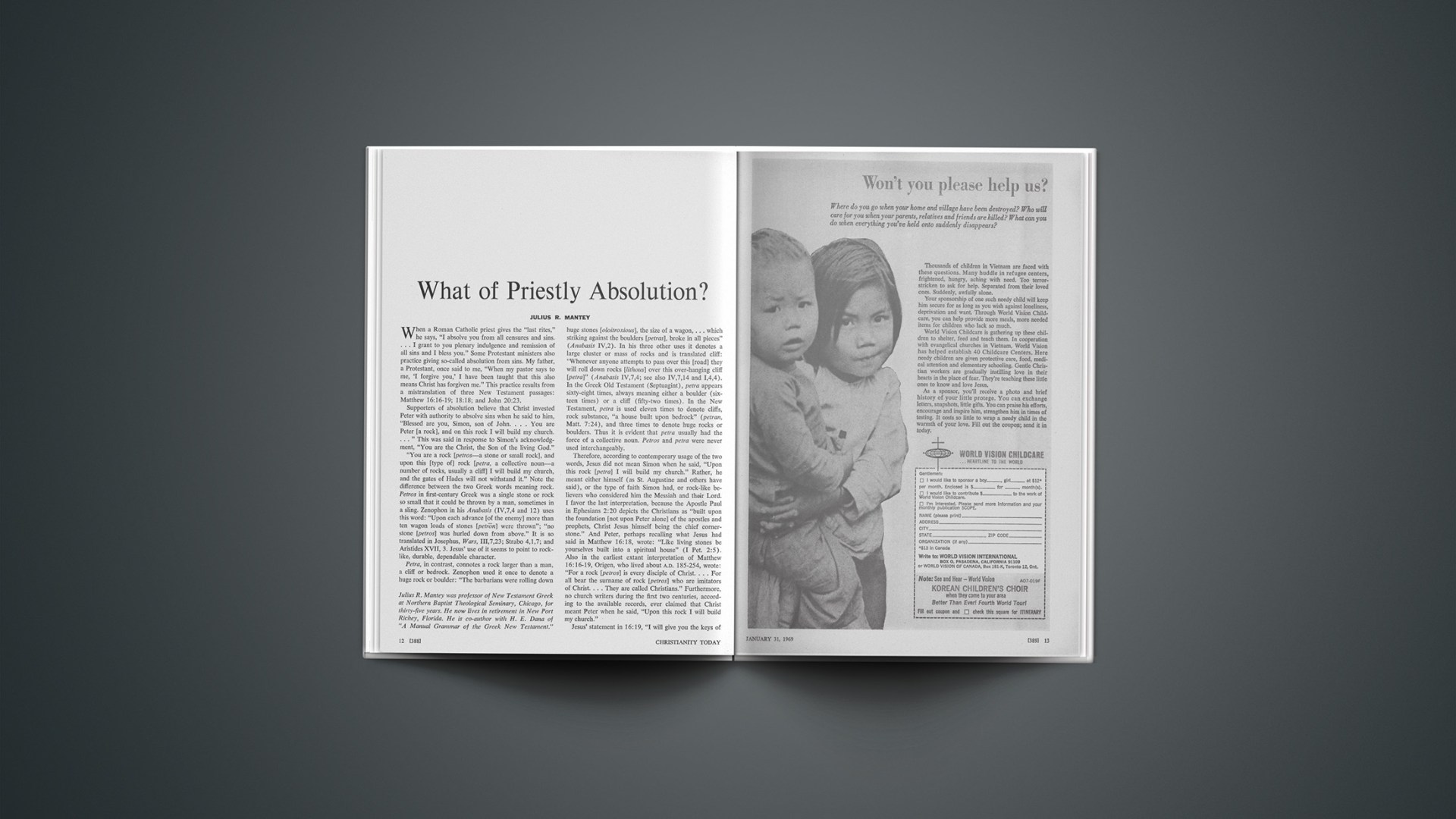When a Roman Catholic priest gives the “last rites,” he says, “I absolve you from all censures and sins.… I grant to you plenary indulgence and remission of all sins and I bless you.” Some Protestant ministers also practice giving so-called absolution from sins. My father, a Protestant, once said to me, “When my pastor says to me, ‘I forgive you,’ I have been taught that this also means Christ has forgiven me.” This practice results from a mistranslation of three New Testament passages: Matthew 16:16–19; 18:18; and John 20:23.
Supporters of absolution believe that Christ invested Peter with authority to absolve sins when he said to him, “Blessed are you, Simon, son of John.… You are Peter [a rock], and on this rock I will build my church.…” This was said in response to Simon’s acknowledgment, “You are the Christ, the Son of the living God.”
“You are a rock [petros—a stone or small rock], and upon this [type of] rock [petra, a collective noun—a number of rocks, usually a cliff] I will build my church, and the gates of Hades will not withstand it.” Note the difference between the two Greek words meaning rock. Petros in first-century Greek was a single stone or rock so small that it could be thrown by a man, sometimes in a sling. Zenophon in his Anabasis (IV,7,4 and 12) uses this word: “Upon each advance [of the enemy] more than ten wagon loads of stones [petro̅n] were thrown”; “no stone [petros] was hurled down from above.” It is so translated in Josephus, Wars, III,7,23; Strabo 4,1,7; and Aristides XVII, 3. Jesus’ use of it seems to point to rock-like, durable, dependable character.
Petra, in contrast, connotes a rock larger than a man, a cliff or bedrock. Zenophon used it once to denote a huge rock or boulder: “The barbarians were rolling down huge stones [oloitroxious], the size of a wagon, … which striking against the boulders [petras], broke in all pieces” (Anabasis IV,2). In his three other uses it denotes a large cluster or mass of rocks and is translated cliff: “Whenever anyone attempts to pass over this [road] they will roll down rocks [lithous] over this over-hanging cliff [petra]” (Anabasis IV,7,4; see also IV,7,14 and I,4,4). In the Greek Old Testament (Septuagint), petra appears sixty-eight times, always meaning either a boulder (sixteen times) or a cliff (fifty-two times). In the New Testament, petra is used eleven times to denote cliffs, rock substance, “a house built upon bedrock” (petran, Matt. 7:24), and three times to denote huge rocks or boulders. Thus it is evident that petra usually had the force of a collective noun. Petros and petra were never used interchangeably.
Therefore, according to contemporary usage of the two words, Jesus did not mean Simon when he said, “Upon this rock [petra] I will build my church.” Rather, he meant either himself (as St. Augustine and others have said), or the type of faith Simon had, or rock-like believers who considered him the Messiah and their Lord. I favor the last interpretation, because the Apostle Paul in Ephesians 2:20 depicts the Christians as “built upon the foundation [not upon Peter alone] of the apostles and prophets, Christ Jesus himself being the chief cornerstone.” And Peter, perhaps recalling what Jesus had said in Matthew 16:18, wrote: “Like living stones be yourselves built into a spiritual house” (1 Pet. 2:5). Also in the earliest extant interpretation of Matthew 16:16–19, Origen, who lived about A.D. 185–254, wrote: “For a rock [petros] is every disciple of Christ.… For all bear the surname of rock [petros] who are imitators of Christ.… They are called Christians.” Furthermore, no church writers during the first two centuries, according to the available records, ever claimed that Christ meant Peter when he said, “Upon this rock I will build my church.”
Jesus’ statement in 16:19, “I will give you the keys of the kingdom of heaven …,” seems to have meant that Peter, knowing Christ was the Messiah and Saviour, had the experience and knowledge to help lead people through faith in Christ into a saving relationship with him. In Luke 11:52 Christ refers to lawyers who apparently have “the key of knowledge” of the will of God but do not use it rightly. Believers make use of the “keys” whenever they persuade others to become Christians.
The most conspicuous mistranslation of this passage comes in the second part of verse 19. This is often translated as if there were a future passive construction of verbs in the Greek when instead the tense is future perfect passive. Note the tremendous difference in meaning. The future passive reads “Whatever you bind on earth shall be bound in heaven, and whatever you loose on earth shall be loosed in heaven.” But the future perfect passive reads “Whatever you bind on earth shall have been bound in heaven, and whatever you loose on earth shall have been loosed in heaven.” The former seems to say that heaven will ratify whatever the disciples agree upon. But the latter states the reverse, that the disciples are to ratify on earth whatever heaven has revealed to them. There is no defensible reason to use the former translation.
A Flight from Reality
It is imperative that all ecumenically-minded Christians engage in a critical appraisal of the current trend towards institutional, structural oneness as the ecumenical ideal.
The illusion is being entertained and propagated that what matters most in fulfilling the ecumenical goal is that denominations and traditions should become institutionally one. Organizational oneness, ecclesiastical togetherness, is given priority over corporate agreement as to what the Churches believe, or should believe. It also takes precedence over a common understanding as to what the Church’s mission in the world is, and what a united Church should do in its environment, local and national. When we are one Church structurally, so the leaders of the American “Consultation on Church-Union” proclaim, we will get down to the establishment of doctrinal foundations, and to determining the nature of our task in the world of today. For anyone to question this procedure and the premise upon which the activity of these distinguished ecumeniacs is based, is to be labeled “un-ecumenical.”
This trend toward the substitution of the institutional for the communal is a flight from reality in a revolutionary and chaotic time. It ignores the serious plight in which Christian theology finds itself in many church circles today, where the reality of God is questioned, or His Presence is limited to the secular order, where the new life in Christ has become largely meaningless and is disdained, where evangelism is identified with, and limited to, the effort to humanize the social environment in which people live, and to create a concern among those who have for those who have not. It forgets the fact that the most unified church structure in Christian history was the Roman Catholic Church in the Hispanic world. But, as is recognized in Roman Catholic circles today, this monolithic institution had the most disastrous record in human annals. It created a Catholic nominalism in Latin America. It made it legitimate to say, “I am an atheist, but I am a Catholic.” It created the most diabolic and futile clericalism in Christian history. It produced a spiritual wilderness. This same flight from reality, and the unwillingness to wrestle with issues relating to the Eternal and the Temporal, is today producing in certain Protestant circles a mood in which institutional unity and hierarchical authority are being hailed as the one solution to all semblance of Christian dividedness.—From “The Ecumenical Movement—Whence? and Whither?,” by John A. Mackay, in the Bulletin of the Department of Theology of the World Alliance of Reformed Churches and the World Presbyterian Alliance, Summer, 1968.
Greek grammars are unanimous about how to translate the future perfect passive tense. W. D. Chamberlain, author of An Exegetical Grammar of the New Testament, is representative: “Estai dedemenon and estai lelumenon (Matthew 16:19). This is wrongly translated ‘shall be bound’ and ‘shall be loosed,’ seeming to make Jesus teach that the apostles’ acts will determine the policies of Heaven. They should have been translated ‘shall have been bound’ and ‘shall have been loosed.’ ” Many other scholars who have written commentaries on the passage agree. In that earliest extant interpretation, Origen wrote that men remained “bound” by their sins and could not be “loosed” from them until they repented and could say with Peter, “Thou art the Christ.” “But when one judges unrighteously and does not bind upon earth according to the word of God, nor loose upon earth according to his will, the gates of Hades prevail against him.”
Another passage inadequately translated in most English New Testaments is John 20:23. For example, the Revised Standard Version has this: “If you forgive the sins of any, they are forgiven; if you retain the sins of any, they are retained.” In Greek the words for “forgiven” and “retained” are not in the present tense but in the perfect. And, according to the unanimous testimony of Greek grammarians, the perfect tense pictures a past action. Wilbur T. Dayton made an original, contextual study of 621 occurrences of the perfect tense in writings from the centuries immediately before, during, and after the first century A.D., when the New Testament was written. His study led him to state: “No conclusive proof has been found of any use of the perfect tense in Greek where due to grammatical considerations the significance of the past tense was lost.”
Thus the passage clearly teaches that church leaders, in persuading people to become believers, are not to consider them as such until they have met the conditions of God’s forgiveness. J. B. Rotherham has indicated this in his accurate translation: “Whosesoever sins ye may remit, they have been remitted to them: whosesoever sins ye may be retaining, they have been retained.”
The first known claim by a minister that he could absolve sins was not made until nearly 200 years after Jesus’ death. Callistus (also known as Calixtus I), who became pastor in Rome over the local church there in about A.D. 220, was the first to say he could forgive people’s sins in behalf of God. This we learn from the writings of Hippolytus, a fellow pastor of Callistus in Italy. Hippolytus was enraged by this innovation and denounced it as a heresy.
If Peter or any other apostle received authority from Christ to absolve sins, there is no evidence in the New Testament that he ever exercised it. Certainly Peter did not when he reprimanded Simon, the Magician (Acts 8:22): “Repent therefore of this wickedness of yours, and pray to the Lord that, if possible, the intent of your heart may be forgiven you.” According to the Apostle Paul, only Christ is authorized to absolve people’s sins: “There is one God, and there is one mediator between God and men, the man Christ Jesus, who gave himself as a ransom for all” (1 Tim. 2:5). After Christ appeared to Paul on the Damascus road, Ananias instructed him to confess his sins directly to Christ: “Rise and be baptized, and have your sins washed away by calling on his name” (Acts 22:16).
We see, then, that evidence from Scripture, theology, history, and grammar combine to pronounce absolution an indefensible doctrine.
PREREQUISITES FOR PREACHING
The picturesque village of Olney in Buckinghamshire, England, is still much as it was when the Reverend John Newton served the parishioners as their curate (1764–79). In the fine old church there is a new and handsome pulpit, but the pulpit used by Newton is on view at the back of the church. Although Olney is now better known for its annual transatlantic Pancake Race, there is still a quiet charm and peace about the old village, and the spirit of the great pastor is unmistakably present.
John Newton is known for his evangelical preaching and his hymns, still sung in churches of many denominations. His conversion from a brutal slave-trader to a convinced Christian is often cited to demonstrate the power of the Gospel. But his letters, written under the pseudonym “Omicron,” are not as well known as they should be. His “Letter to a Young Minister” written in 1750 still deserves to be read by every young minister.
I wish you, upon your entrance into the Ministry, to have a formed and determinate idea, what the phrase “Preaching the Gospel” properly signifies. The Gospel is the power of God unto salvation; and this Gospel is preached when it is accompanied with some due degree of that demonstration and power from on high, which is necessary to bring it home to the hearts and consciences of the hearers.… To declare the truths of the Gospel, is not to preach it.… Many of the great truths of the Scriptures may be represented by a man of a warm and lively imagination, in such a manner as considerably to affect the imaginations and passions of an audience, even though he should not himself believe a word of the subject. This would be an effect of no higher kind than is produced upon the stage.… It is a poor affair to be a stage-player in divinity, to be able to hold a congregation by the ears, by furnishing them with an hour’s amusement, if this be all. But the man who is what he professes to be, who knows what he speaks of, in whom the truth dwells and lives, who has not received the Gospel from books, or by hearers only, but in the school of the great Teacher, acquires a discernment, a taste, a tenderness, and a humility which alone qualify him. Thus shall you come forth as a scribe, well instructed in the mysteries of the Kingdom, a workman that needeth not to be ashamed, approved of God, acceptable to men, rightly dividing the word of truth. Thus your trumpet shall not give an uncertain sound to raise and disappoint the expectations of your hearers.
Newton advises against what he calls “the recital of a school declamation,” by which he means a mimicry of theatrical action, affectations, and pomposity. He speaks against those who consider vociferation a mark of powerful preaching, and commends simplicity and the art of being natural. Very loud preaching, he says, is a bad habit; “people are seldom, if ever, stunned into the love of the truth.” Warning against angry and scolding preaching, he writes, “The Gospel is a benevolent scheme, and whoever speaks in the power of it, will assuredly speak in love. In the most faithful rebukes of sin, in the most solemn declaration of God’s displeasure against it, a preacher may give evidence of a disposition of good-will and compassion to sinners.”
Newton concludes his “Letter to a Young Minister” by saying:
If we indulge invective and bitterness in the pulpit, we know not what spirit we are of; we are but gratifying our own evil tempers, under the pretence of a concern for the cause of God and truth. A preacher of this character, instead of resembling a priest bearing in his censer hallowed fire taken from God’s altar, may be compared to the madman described in the Proverbs, who scattereth at random fire-brands and arrows and death, and saith, “Am not I in sport?” Such persons may applaud their own courage and think it a great attainment that they can set their congregation at defiance; but they must not expect to be useful, so long as it remains a truth, that the wrath of man worketh not the righteousness of God.
Whether in his remote church of St. Peter and St. Paul, Olney, or in the London church of St. Mary Woolnoth, where the Lord Mayor would have been among his parishioners, Newton lived by a simple creed: “I remember two things, that I am a great sinner, and that Christ is a great Saviour.”—J. D. R. FRANKLIN, rector, St. Peter’s Church, Sherbrooke, Quebec, and canon of Quebec Cathedral.









